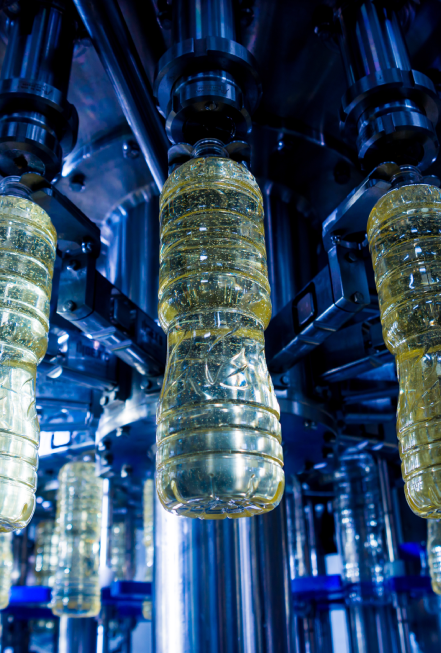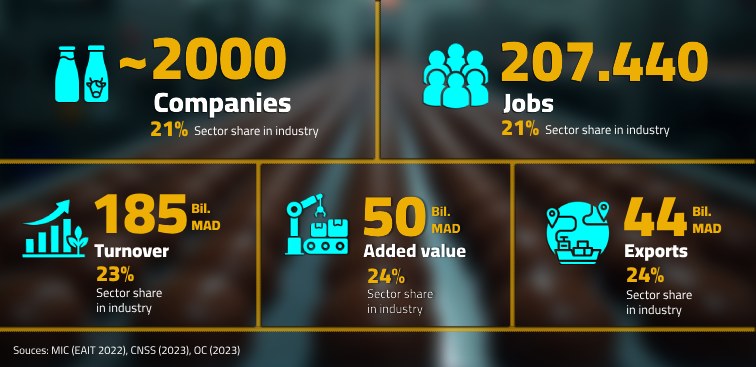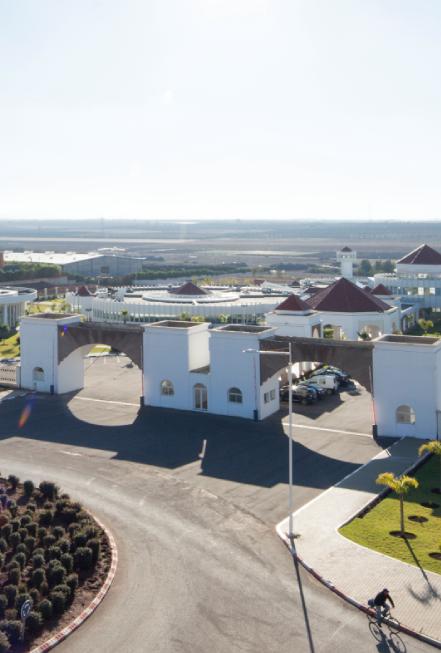INTRODUCTION

The Agri-Food Industries (IAA) sector is of prime importance in the socio-economic development process of our country. This importance is linked to the role it plays in terms of food security in the Kingdom, integration between the productive upstream and the downstream processing and balancing the trade balance.
This sector is a major contributor to the industrial sector, employing 21% of the industrial workforce, contributing 24% of industrial value added, and generating 23% of industry turnover.
The Agri-food Industry is a highly diversified sector with activities that meet the needs of Moroccan consumers and provide a wide range of food products. Indeed, this sector encompasses a broad spectrum of activities, from the initial processing of agricultural and fishery products to their complete transformation.
The sector remains attractive for foreign direct investment. It currently hosts investments from multinationals with high potential based on recognized know-how and a wide range of products, including Nestlé, Danone, Fromagerie Bel, Lesieur-Cristal (Avril Group), and Mondelēz International. The turnover contributed by foreign-invested companies is 25% of the sector's overall turnover.
In addition, this sector has seen the emergence of several national groups (COPAG, Zine Group, Anouar Invest Group, etc.) in recent years, which now play a key role in job creation, the development of local resources, and the promotion of exports, thus contributing to the Kingdom's food sovereignty and the growth of the Moroccan economy.
The rise of these national groups has been supported by targeted sectoral strategies implemented by the State to strengthen the competitiveness of the food industry and boost its growth.
Federations/ Professional associations in the sector:
- National Federation of Agri-Food (FENAGRI);
- Federation of Agricultural Product Canning Industries of Morocco (FICOPAM);
- Association of Biscuits, Confectionery and Chocolate (AB2C);
- Moroccan Association of Pasta and Couscous Industries (AMIPAC);
- National Federation of Fishery Product Valorization Industries (FENIP);
- National Union of Fish Canning Industries (UNICOP);
- Professional Sugar Association (APS);
- Maroc Lait;
- Moroccan Beverage Association (AMB);
- Moroccan Association of Juice Industries (AMAJUS);
- Moroccan Association of Tea and Coffee Manufacturers (AMITC);
- Association of Mineral and Spring Water Producers (APEMS);
- Professional Association of Moroccan Oil Manufacturers (APFHM);
- National Federation of Flour Milling (FNM);
- Interprofessional Federation of the Poultry Sector (FISA);
- Interprofessional Federation of Red Meats (FIVIAR).
Main companies in the sector:
COSUMAR, CENTRALE DANONE, COPAG, FROMAGERIE BEL, NESTLE, MONDELEZ, BEST BISCUITS MAROC, MICHOC, COMPAGNIE CHERIFIENNE DE CHOCOLATERIE, CARTIER SAADA, LES CONSERVES DE MEKNES, DRISCOLL'S MAROC, FRULACT, DARI COUSPATE, DALIA FOODS, KAYNA GROUP, ZALAR HOLDING, KOUTOUBIA, FOODIS, UNIMER, LES CONSEVERIES MAROCAINES DOHA, NOUVELLE COSARNO, GIL COMES, LES EAUX MINERALES D'OULMES, FANDY, MOULINS ZINE, MOULINS MOONY, KENZ MAROC, LESIEUR-CRISTAL, LES HUILERIES DU SOUSS BELHASSAN, MARGAFRIQUE, SOMATHES, VMM, etc.
Key figures:

ASSISTANCE AND SUPPORT
In April 2017, a Program Contract was concluded between the Government and the agri-food industry sector. This partnership, which extends over the period 2017-2022, aims to strengthen the integration between upstream production and downstream processing to accelerate the development of the agri-food industries.
It is based on concrete and targeted measures capable of boosting the growth of the agri-food industry sector, including:
• Cross-cutting measures such as accelerating innovation through the revitalization of the Technical Center for Agri-Food Industries, supporting certification/standardization efforts, and providing support to FENAGRI (National Federation of Agri-Food) to facilitate the implementation of the partnership;
• Specific measures for the 7 key agri-food industries identified, namely the fresh fruit and vegetable valorization industry, the processed fruit and vegetable industry, the olive oil industry, the dairy industry, the meat industry, the biscuit-chocolate-confectionery industry, and the pasta and couscous industry:
- Investment support
- Export support
- Marketing support
This integrated mechanism aims to maximize the impact of investments, particularly in terms of creating stable jobs, equitable development of territories, prioritizing promising sectors for the national economy and sustainable development.
Four support systems are planned:
- A main support system composed of:
- 5 common bonuses, awarded according to criteria relating to the number of jobs, gender approach, local integration, sustainable development, jobs of the future and upgrading.
- An additional territorial bonus, aimed at encouraging investment in the least favored provinces.
- An additional sectoral bonus, granting incentives to boost promising sectors.
- A specific support mechanism for very small, small and medium-sized enterprises.
- A mechanism dedicated to the development of Moroccan investments abroad.
- Exclusive support measures for strategic projects.
Eligibility criteria
The total subsidy can reach up to 30% of the amount of the eligible investment and is conditioned by two eligibility criteria:
- Either exclusively by the number of jobs created, which must be greater than 150 jobs, without requiring a threshold for the investment amount;
- Or jointly on the basis of the investment amount (≥ 50 million MAD) and the number of stable jobs to be created (at least 50).
Companies operating in the food industry sector, eligible for investment agreements with the State, may benefit from the following incentives:
- Exemption, in accordance with Article 92 (I-6°) of the General Tax Code (CGI), from VAT on internally acquired investment goods. This exemption applies to investment projects valued at 50 million dirhams or more. The exemption period is 36 months from the date of signing the investment agreement or the issuance of the building permit. This period can be extended by six months once.
- Exemption, in accordance with Article 123-22°-b) of the CGI, from VAT on the importation of capital goods, materials, and tools necessary for an investment project valued at 50 million dirhams or more. This exemption applies for 36 months from the date of the first import operation, with the possibility of a 24-month extension.
This exemption is also granted to parts, spare parts and accessories imported at the same time as the aforementioned equipment.
- Exemption, in accordance with Article 164.1.p of the Customs and Indirect Tax Code, from import duties on capital goods, materials, and tools necessary for an investment project valued at 50 million dirhams or more. This exemption applies for 36 months from the date of the first import operation, with the possibility of a 24-month extension.
- This exemption is also granted to parts, spare parts and accessories imported at the same time as the capital goods, materials and tools for which they are intended.
Companies in the food industry sector can benefit from the State's industrial innovation support program, which aims to enhance competitiveness and performance by supporting company-led innovation and R&D projects.
The three offers provided by the Innovation Support Fund (FSI) are as follows:
• Offer 1 "Support for the valorization of patents":
Support for the industrial/commercial valorization of patents with a support of 80%, capped at 1 MDH per project.
• Offer 2 "Support for industrial R&D/Innovation projects":
Support for innovation and R&D projects related to product/process development through a contribution of 60% capped at 4 MDH/project.
• Offer 3 "Support for industrialization in the pilot phase":
Support for the technological industrialization of innovative solutions and products by covering 30% of the costs related to the pilot phase up to 5MDH/project.
SMEs in the food industry sector can benefit from specific support within the framework of the programs developed by the National Agency for the Promotion of Small and Medium Enterprises (ANPME):
- ISTITMAR PME
- TATWIR CROISSANCE VERTE
- MOWAKABA
TRAINING
The agri-food sector benefits from tailored training programs to develop a skilled workforce and support sector growth.
Existing training systems:
- OFPPT vocational training establishments, including the Specialized Institutes in the agri-food industry and olive growing in Beni-Mellal, Meknes and Berkane as well as the Institute specialized in the manufacture of agri-food products in Casablanca.
- The Cités des Métiers et des Compétences (CMC) of Agadir, Nador, Laayoune, Tamesna, Tangier, Beni Mellal, etc.
- Public schools and universities providing courses / cycles dedicated to the agri-food sector (engineer, master's, bachelor's, higher technician).
- The ANAPEC "TAEHIL" program aimed at improving the employability of job seekers.
- The Interprofessional Group for Assistance to the Agri-Food Sector "GIAC AGRO".
Reception Infrastructure
Operators in the food industry sector can benefit from the industrial land offer set up by the State to promote and facilitate investment, both foreign and national, and to adequately meet the evolving needs of investors:
- Integrated Industrial Rental Parks (PIL) with turnkey premises. Each park includes a one-stop administrative counter, a local employment pool, ad hoc services and a training system.
- Integrated Industrial Platforms (P2I) guarantee the availability of land at an attractive cost, a complete, diversified real estate and logistics offer that complies with the best international standards, as well as on-site services and a one-stop administrative counter.
- Network of Agropoles developed in the main agricultural regions of Morocco, with the aim of creating synergies between the upstream production and the downstream processing to strengthen the processing and marketing of agricultural products, while integrating the components of training, R&D and marketing.
- The agropoles of Meknes, Souss, Beni Mellal and Berkane are already operational. The other agropoles are under construction or in the study phase (Gharb, Haouz, Loukkos).


